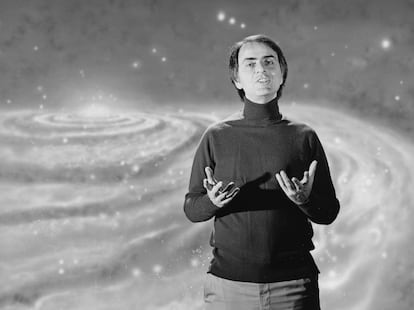‘Cosmos’: Carl Sagan was right (and we didn’t pay much attention to him)
The narrator explored the universe in the 1980 series with charisma, using raw visual effects and the music of Vangelis. He spoke of other worlds that can teach us about our own. Decades later, the program has aged remarkably well

When prehistoric humans would put out their campfires at night, they were alone with the stars. There was something magical about the way the sky would appear unchanged when chaos prevailed on Earth. On top of that magic, those who gazed at the stars also observed their patterns, just as Ptolemy did many centuries before Copernicus, Galileo and Kepler became fascinated with them. With progress, astrology was gradually replaced by astronomy - at the beginning they were the same thing. In ancient cultures, astrology also served the political power, which sought to control it, as, at the time, predicting the fall of a tyrant was tantamount to instigating his toppling.
The legendary science communicator Carl Sagan provided a marvelous explanation in his Cosmos series, which aired in 1980. And, like any good advocate of rationalism, he took the opportunity to ridicule horoscopes. He picks up several newspapers and reads out the fortunes for one sign: Libra. They are all so vague that they could apply to anyone; all so different from each other that they cannot respond to any rationale. (I personally knew of a publication where the page editors, an old trade, amused themselves by interchanging the paragraphs of each star sign, and no one ever noticed).
There is also a modern and compelling version of Cosmos, presented by Neil deGrasse Tyson. The original, consisting of 13 one-hour episodes, has aged remarkably well. Sagan threw in some updates at the end of the episodes in 1989 with the latest findings. But it didn’t require too much correction. The series was made at a time when the fascination with the space race was on the wane, hampered by budget cuts during the oil crisis. Sagan bemoaned the fact that space research was being cut back while military spending was on the increase. Nonetheless, significant steps had been taken towards the comprehension of the near and distant stars, thanks to the probes. Back then, photos of Mars landscapes were beginning to emerge, albeit not in high definition.
Sagan, a physicist and astrophysicist, showed us the universe with his charisma, and the aid of rustic visual effects (cutting edge for the time), historical dramatizations and the beautiful music of Vangelis. He delivered clear answers and also posed great questions. Is there life out there, could it be another nature? The big question of whether life is an exceptional or abundant phenomenon is still unresolved four decades later. He favored the second idea - that there was probably life in millions of places. And the chances of contacting other advanced civilizations were slimmer, but he did not lose hope and encouraged us to try to do so. He believed that an encounter of this kind would lift us out of terrestrial provincialism. He also ridicules the UFO phenomenon - very popular at that time - which he believes to be akin to religion and superstition.
Incidentally, Sagan made use of his knowledge of other planets to talk about Earth. Venus, a greenhouse inferno, is the perfect, and horrifying, example of what could happen if we continue to destroy the environment of our own planet. Sagan warned that the devastation of vegetation and pollution caused by humans could render Earth uninhabitable. “Earth does not need to become like Venus to turn into a barren and lifeless environment.”, he assured. At that time there was certainly less of a scientific consensus on the effects of climate change, but he was convinced of it. Some people even question it today, when we have reached 38 degrees Celsius in April and it has not rained for 135 days. The esteemed scientist confessed his obsession with the self-destructive capacities of our species, from ecological destruction to the nuclear threat, which was commonplace during the Cold War years and has now resurfaced.
Half a century after the last time a human set foot on the Moon, 43 years after the first Cosmos program, 27 years after Sagan’s passing, the space shuttle that was supposed to take us back to the Moon and later to Mars exploded at liftoff. The company (Elon Musk’s) behind the venture believes it is an achievement that it did not explode earlier.
If Sagan is still relevant today, perhaps we have not advanced as much as we think we have. We might still be insignificant in the universe.
Sign up for our weekly newsletter to get more English-language news coverage from EL PAÍS USA Edition
Tu suscripción se está usando en otro dispositivo
¿Quieres añadir otro usuario a tu suscripción?
Si continúas leyendo en este dispositivo, no se podrá leer en el otro.
FlechaTu suscripción se está usando en otro dispositivo y solo puedes acceder a EL PAÍS desde un dispositivo a la vez.
Si quieres compartir tu cuenta, cambia tu suscripción a la modalidad Premium, así podrás añadir otro usuario. Cada uno accederá con su propia cuenta de email, lo que os permitirá personalizar vuestra experiencia en EL PAÍS.
¿Tienes una suscripción de empresa? Accede aquí para contratar más cuentas.
En el caso de no saber quién está usando tu cuenta, te recomendamos cambiar tu contraseña aquí.
Si decides continuar compartiendo tu cuenta, este mensaje se mostrará en tu dispositivo y en el de la otra persona que está usando tu cuenta de forma indefinida, afectando a tu experiencia de lectura. Puedes consultar aquí los términos y condiciones de la suscripción digital.









































